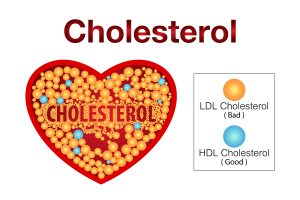 Should you be worried if your total cholesterol is over 200? Your doctor may have told you that you’re at high risk for heart disease and you must take a statin medication. But there’s controversy over cholesterol and heart disease. And doctors are changing their recommendations.
Should you be worried if your total cholesterol is over 200? Your doctor may have told you that you’re at high risk for heart disease and you must take a statin medication. But there’s controversy over cholesterol and heart disease. And doctors are changing their recommendations.
It turns out that the most important number isn’t total cholesterol nor LDL, but HDL. And the higher that is, the less risk of heart disease. Your triglyceride levels are also key to heart disease risk.
It’s not your total cholesterol number but the ratio of your LDL to HDL that can indicate risk. You are also at risk when you have high H1Ac and insulin resistance, along with high CPR measures of inflammation. Why are so many doctors mistaken about HDL? They may not have read the latest Heart Association reports.
Cholesterol and Heart Disease: What’s Really Important
I’ve been concerned that the connection between cholesterol and heart disease isn’t necessarily evidenced by scientific research. The reason I write this blog is to offer new information on disease prevention, which labs and biomarkers to pay attention to, and what we need to be doing (exercise and diet) to stay healthy and alive longer.
Most important, how do we increase our healthspans? That is, what can we do to not just stay alive, but stay healthy? I want to live longer if I can live healthily without diseases.
And until now, I’ve not worried about my cholesterol numbers. They were always within norms. But now my LDL is over 200 and my doctor is telling me I should be on medications. It may be due to switching to eating a high fat, low carb diet. My LDL is high, okay, but my HDL is really high, and that’s a good thing.
Statin medications come with all sorts of side-effects (muscle and joint aches, weakness, fatigue) and so far, research hasn’t proven that high LDL causes heart attacks or clogged arteries. In fact, most heart attacks occur in people with normal cholesterol numbers.
Here is what I’m learning, according to some highly respected experts.
What Is Cholesterol?
Cholesterol is a waxy, fat-like substance that occurs naturally in your body. It’s usually perceived as something bad but it is essential for your body to function.
- It contributes to cell membranes.
- Your body needs it to make hormones and vitamin D.
- It’s essential to survive.
- People with high HDL numbers live longer.
- They have less risk of dementia.
Your body makes all the cholesterol it needs but it also absorbs a small amount from foods such as eggs, meat and full-fat dairy products. Lowering your consummation of these saturated fats may lower your LDL but it also lowers your HDL and won’t protect you from heart disease.
Eating a diet rich in fats, however, will raise your levels of the so-called good cholesterol, the HDL which protects your arteries.
What Do Your Cholesterol Numbers Mean?
According to an excellent article on Healthline,
When people talk about cholesterol, they aren’t talking about cholesterol but referring to lipoproteins – the structures that carry cholesterol in the bloodstream. There are several kinds of lipoproteins, but the two most relevant to heart health are low-density lipoprotein (LDL) and high-density lipoprotein (HDL).
- Most doctors run a basis cholesterol panel: total cholesterol, LDL, HDL, VLDL (very low density lipoprotein), and triglycerides.
- Total cholesterol is actually meaningless because it doesn’t reveal the makeup of the various particles.
- HDL and triglycerides are the two most important numbers on your test results. High HDL is good, low triglycerides is also good.
- VLDL should be as low as possible.
- Eating a high-fat, low-carb diet will dramatically improve HDL and triglycerides (and without medications.
If you want to learn more about these tests and your risk factors for heart disease, I recommend this book:
Cholesterol Clarity: What the HDL is Wrong with My Numbers? by Jimmy Moore and Dr. Eric C. Westman.

Recent Comments